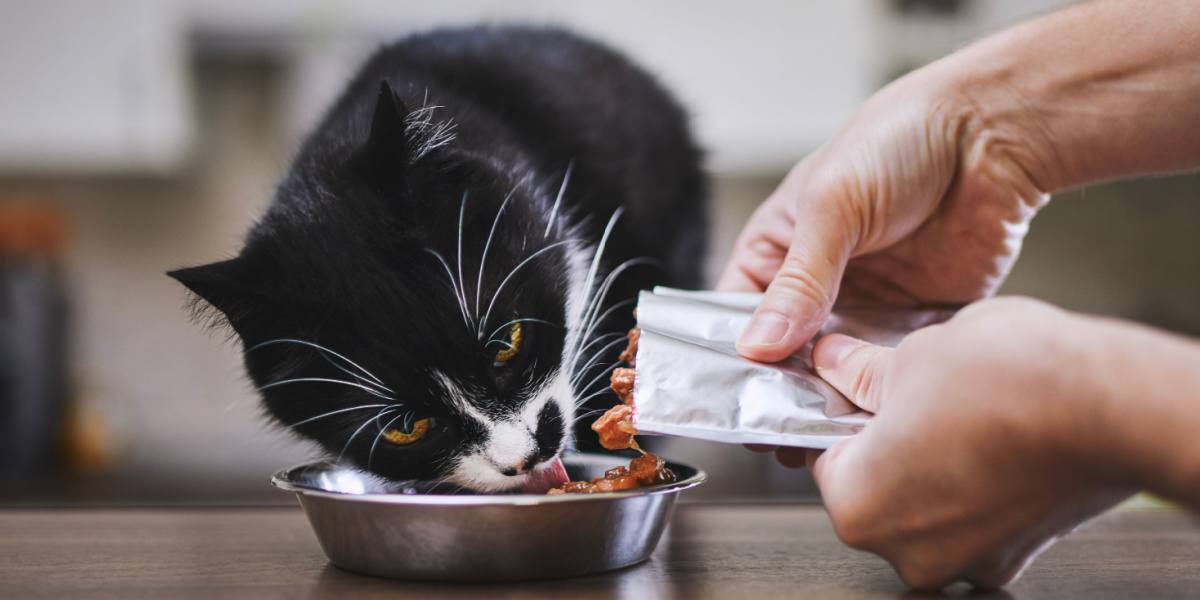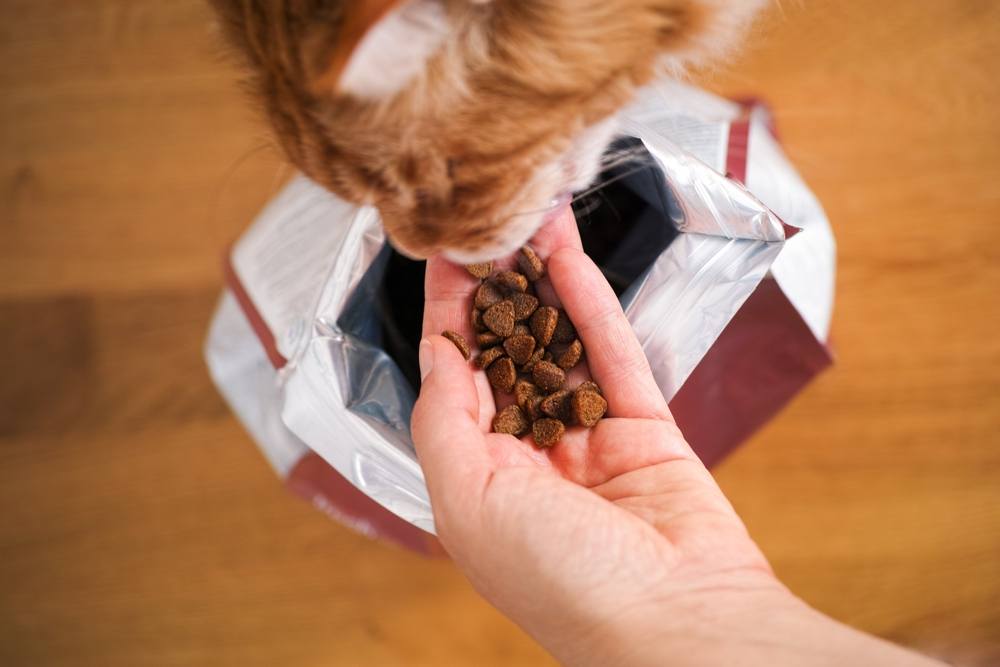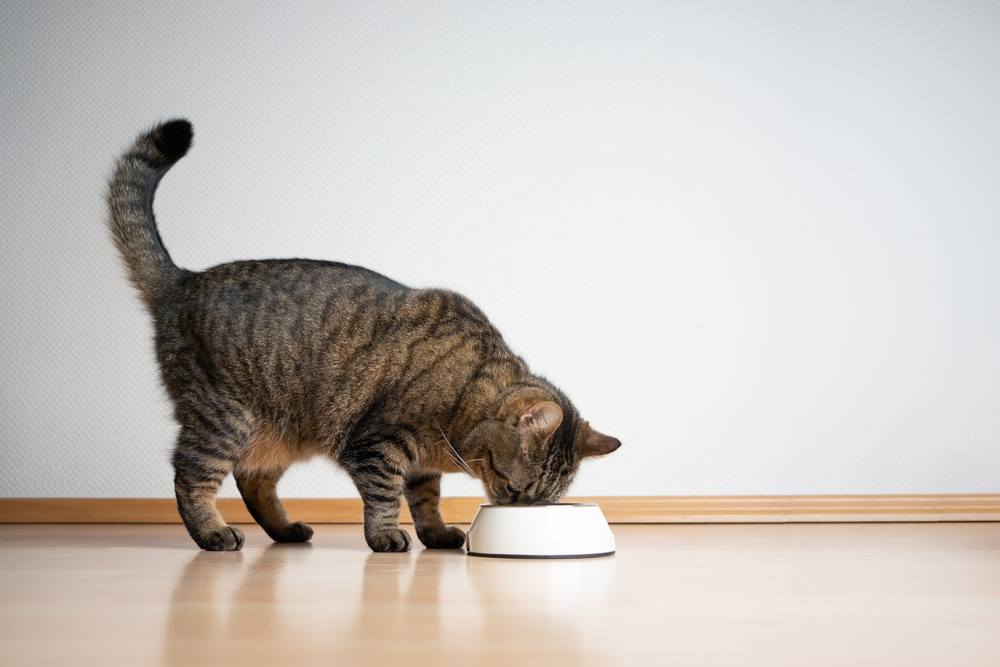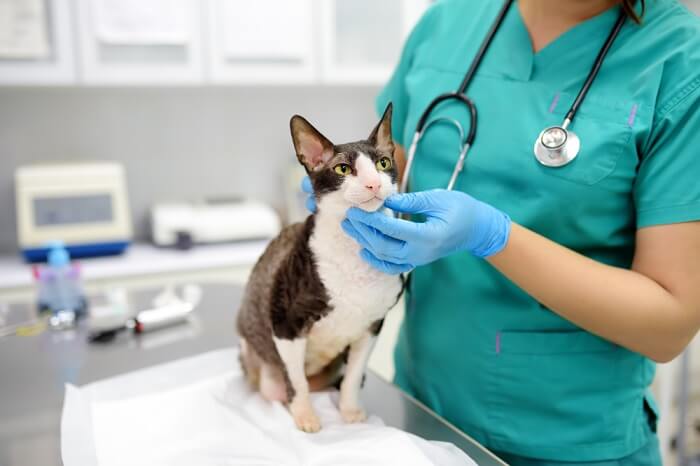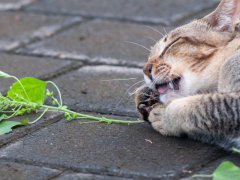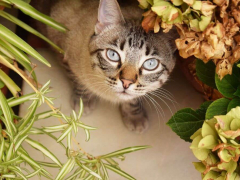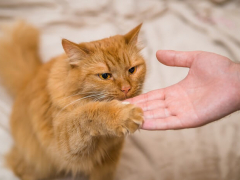Jaromir Chalabala / Shutterstock.com
Thanks to the vast array of high-quality commercial cat foods on the market, it’s easier than ever to provide your cat with the right nutrition to maintain good health. Although many cat foods include natural preservatives and are shelf-stable for a long time, they don’t last forever.
Even if food is not spoiled, nutrients degrade over time, so it’s important to only feed food that is still within its expiration or “Best by” window. Read on to learn all about cat food expiration dates, proper cat food storage practices, and how to know if food is still okay to feed to your cat.
How Long Does Cat Food Last?
Different types of cat food last different amounts of time—both on the shelf and once opened. These are the most common types of commercial cat food, their relative shelf life when unopened, and how long they stay fresh after they have been opened.
Dry Cat Food
Dry cat food, also known as kibble, is very shelf-stable when stored in a cool, dry place. It varies among cat food brands, but unopened dry cat food usually retains its nutrients and stays fresh for about 12 to 18 months after being manufactured. Once opened, use dry cat food within about six weeks.
Wet Cat Food
Whether packed in aluminum cans, or metal or plastic tins or packets, unopened wet cat food stored in a cool, dry place is usually good for about two years after manufacture. Once opened, wet cat food must be refrigerated. Some commercial food companies state that opened canned food might last as long as five to seven days when stored in the fridge in an airtight container. However, it’s best to use leftover wet food within 72 hours.
Freeze-Dried Cat Food
Freeze-dried cat food typically lasts about 12 to 24 months after it has been manufactured. Once opened, use within two to four weeks (or as specified by the manufacturer). Some freeze-dried foods must be refrigerated after opening.
Commercial Fresh Cat Food
It varies by manufacturer, but commercial fresh cat food usually lasts up to a year when stored in the freezer. Once thawed, use within five days or by the date specified by the manufacturer.
Understanding Cat Food Expiration Dates
Ekaterina_Minaeva / Shutterstock.com
The best way to know if an unopened bag or can of cat food is still okay to feed your cat is to look for the expiration date. This date is printed somewhere on the package and lists the month and date by which the food should be used or discarded.
The exact language used to describe the date by which the food should be fed or tossed might vary depending on the manufacturer. Some of the terms you might see include expiration date, “Best by” date and “Use by” date. Technically, these terms have slightly different meanings. For instance, an expiration date and a “Use by” date are hard dates that indicate the food should not be used after that time. On the other hand, a “Best by” date means the food might not taste as fresh or the food might not have the same levels of nutrients after that date.
Although the terms have slightly different meanings, you can use them interchangeably in this case. This is the date by which the food should be used or discarded.
When to Look at Cat Food Expiration Dates
It’s important to check the expiration date before buying a bag or can of cat food. If pet stores don’t manage their inventory closely, it’s possible for food to sit on the shelves longer than intended. Check to make sure that the food is not only past the expiration date, but that it’s far enough away from that date to ensure your cat will be able to finish the food before it expires.
If you forgot to check the expiration date before you purchased the food, or if you ordered the food online, check it prior to opening the bag or can to be sure you’re well within the window of
Why Cat Food Expiration Dates Are Important
Knowing the expiration date of cat food is vital for many reasons. Most importantly, food that is past its expiration date might no longer be safe for consumption if it’s spoiled or rancid. Feeding your cat expired food could make them sick.
Even if food is not spoiled, the nutrients begin to degrade over time. Cat food that’s past the expiration date might not provide the proper nutrition your cat needs.
Finally, food that is past the expiration, best by or use by date might be stale or not taste as good as it should, which can cause cats to turn up their noses and refuse to eat it.
Proper Cat Food Storage
Storing cat food correctly can lengthen its life. Store dry, canned, and freeze-dried cat food in a cool, dry place away from direct sunlight, moisture, and heat. The pantry is usually a great place to store cat food. The garage is generally not a good storage spot since many garages are exposed to moisture and temperature fluctuations. Store commercial fresh cat food in the freezer until you’re ready to use it.
Once opened, keep dry food in the original packaging. Roll down the top of the bag and secure it with a clip. For extra protection, you can place the entire bag inside an airtight storage container. Store opened canned cat food in the refrigerator in the original can with a plastic can cover or in an airtight container. Store thawed commercial cat food in an airtight container in the fridge.
Warning Signs Cat Food Has Gone Bad
Nils Jacobi / Shutterstock.com
Even if the expiration date has not passed, it’s possible for cat food to spoil, become rancid, or otherwise become unsuitable for consumption. This can happen if the food is stored improperly or if the packaging becomes damaged, allowing in air, moisture, or insects. Feeding your cat spoiled food can cause illness. If you see these signs of spoilage in your cat’s food, throw it out:
- Rotten, sour, or unpleasant smell
- Visible mold or dust on the food
- Dry kibble appears wet, soft, or crumbly
- Food appears discolored
- Bulging or leaking cans of wet food
- Rips or holds in a bag of dry cat food
- Contamination by insects or rodents
- Food is past the expiration or “Use by” date
- Cat refuses to eat the food
- Cat becomes sick after eating the food (such as vomiting or diarrhea)
If you think your cat has eaten spoiled food, remove the food and contact your veterinarian for advice. Keep the bag or can with the expiration date and lot number in case you need to refer to it. Many pet food companies will replace the food or provide a refund if the package is intact and the food goes bad prior to the expiration date.
Frequently Asked Questions
Where is the expiration date on dry cat food?
The placement of the expiration date, use by date, or best by date usually varies among different cat food manufacturers. You might have to scan all over the food package to find the printed date. Look at the top of the bag as well as near the guaranteed analysis and nutritional adequacy statement.
How long does sealed dry cat food last?
When unopened, sealed dry cat food usually has a shelf life of about 12 to 18 months after its manufacture date. Once opened, use dry cat food within six weeks.
Is it okay to eat expired cat food?
It is not safe to feed your cat expired cat food. Spoiled or rancid food can make your cat very sick. Even if the food is not spoiled, nutrient degradation occurs over time, so cat food that is past its expiry date might not provide adequate nutrition any longer.
Can cats get sick from expired dry food?
Yes, cats can get sick from expired dry cat food if it has spoiled or gone rancid. If you notice your cat doesn't want to eat the food, or if they become sick after eating the food, stop feeding it and contact your veterinarian.
How do you know if dry cat food is bad?
Dry food can spoil, go rancid, or become stale or moldy if it is improperly stored or if it is past its expiration date, "Best by" date, or "Use by" date. Signs that dry cat food is bad include visible mold or dust on the food, changes in texture (the food feels wet, soft, or crumbly), and an unusual odor or foul smell to the food.
